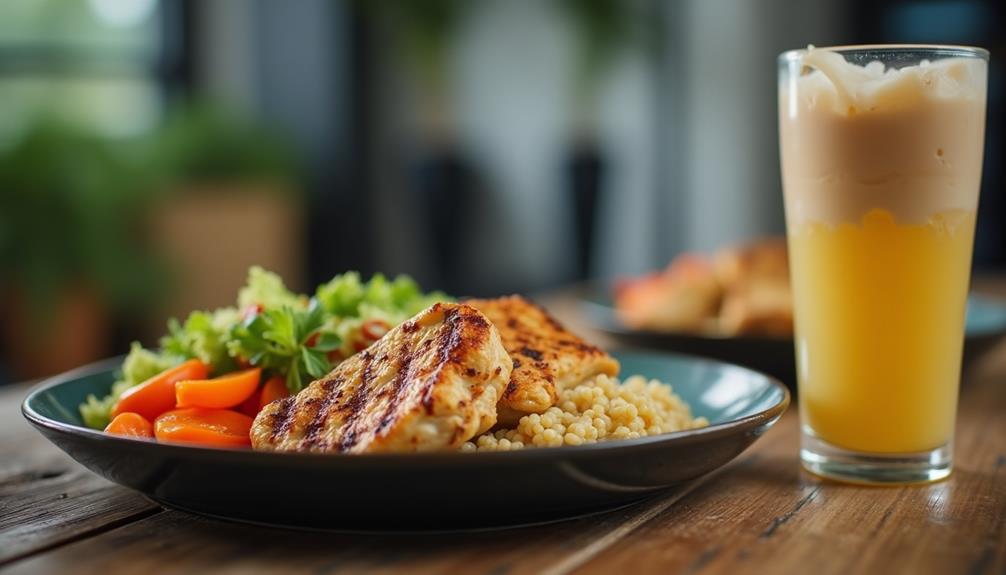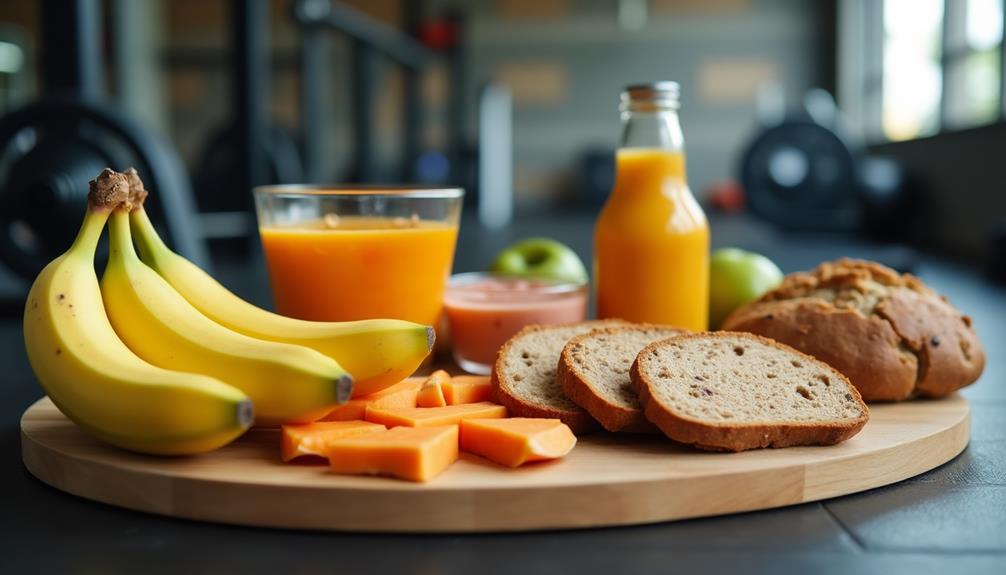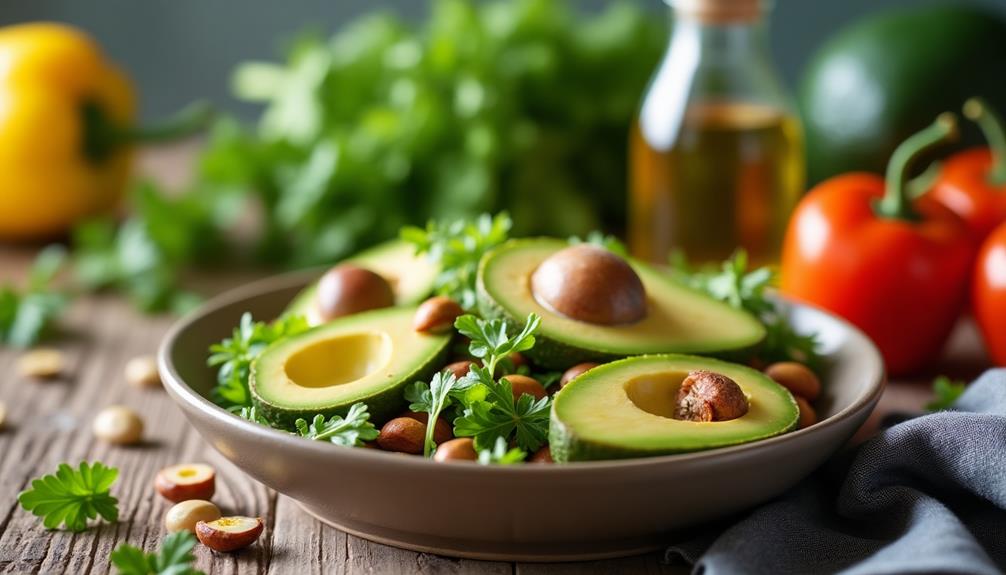To enhance your post-workout nutrition, start by prioritizing protein intake, which promotes muscle recovery. Next, replenish carbohydrates to restore energy levels; aim to consume a mix of both within 30 to 60 minutes after exercise. Don't forget to hydrate; water and electrolyte drinks are key. Include healthy fats, like those from avocados and nuts, for added recovery support. Finally, timing is essential; if a full meal isn't possible, opt for protein shakes or snacks. Listen to your body's needs and plan meals ahead to stay organized. Stick around to discover more actionable strategies for boosting your recovery.
Core Insights
- Prioritize protein intake within 30 to 60 minutes post-workout to support muscle repair and growth.
- Replenish carbohydrates promptly to restore energy levels and replenish glycogen stores.
- Hydrate adequately with water or electrolyte drinks to aid recovery and digestion.
- Include healthy fats in your post-workout meals to enhance recovery and satiety.
- Balance your intake of carbs and protein for optimal muscle recovery and energy restoration.
Prioritize Protein Intake

Protein plays an essential role in your post-workout recovery. After you exercise, your muscles need protein to repair and grow. Consuming protein helps stimulate muscle protein synthesis, which is pivotal for recovery. Aim for a protein-rich snack or meal within 30 to 60 minutes after your workout. This timing maximizes the benefits of protein intake. Some athletes also incorporate HMB supplements to enhance their recovery process, as they can help reduce muscle breakdown and promote lean muscle growth.
Consider options like lean meats, fish, eggs, or plant-based sources like beans and lentils. If you're on the go, protein shakes or bars can be convenient alternatives. Aim for about 10 to 20 grams of protein, depending on your body weight and workout intensity. Prioritizing protein not only aids recovery but also supports your overall fitness goals. It's an indispensable step in fueling your body effectively.
Replenish Carbohydrates

After a tough workout, replenishing carbohydrates is necessary for restoring energy levels. Carbs play a pivotal role in muscle recovery and glycogen replenishment. Your body uses glycogen as a primary energy source during exercise; refueling is crucial. Fast-acting carb powders are recommended by nutritionists for ideal recovery, as they provide easily digestible carbohydrates for rapid energy replenishment.
Aim to consume carbs within 30 minutes post-workout for optimal recovery. This can include options like a banana, a slice of whole-grain bread, or a sports drink. Pairing carbohydrates with protein can enhance recovery further, as this combination supports muscle repair.
A general guideline is to replace about 1.0 to 1.5 grams of carbohydrates per kilogram of body weight. Remember, the right balance of carbs will help you bounce back stronger for your next workout. Prioritize this step for improved performance!
Hydrate Properly

| Fluid Type | Benefits |
|---|---|
| Water | Rehydrates and aids digestion |
| Electrolyte Drinks | Restores minerals and energy |
| Coconut Water | Natural electrolytes with flavor |
Include Healthy Fats

You can find nutritious fats in foods like avocados, nuts, seeds, and olive oil. Incorporating these into your post-workout meal not only supports recovery but also keeps you feeling satisfied longer. These top-notch healthy fats are essential for enhancing muscle gain and overall health. Consuming them regularly can improve your fitness results and support your body's recovery process.
For example, adding a handful of walnuts to your smoothie or drizzling olive oil over a veggie bowl can be beneficial. Just remember to balance your intake with proteins and carbohydrates for optimal results. Prioritizing healthy fats will help you feel your best as you continue your fitness journey.
Timing Matters

Consider a balanced intake of carbohydrates and protein during this time. Carbohydrates help restore energy levels, while protein aids in muscle recovery. If you can't have a full meal, try a protein shake or a small snack.
Emphasize Whole Foods

Whole foods should be at the forefront of your post-workout nutrition strategy. These nutrient-dense options provide the essential vitamins, minerals, and macronutrients your body craves after exercise. Focus on incorporating lean proteins, whole grains, fruits, and vegetables into your meals.
Proteins from sources like chicken, fish, or legumes help repair and build muscle. Whole grains, such as quinoa or brown rice, replenish energy stores with complex carbohydrates. Don't forget to add colorful fruits and veggies, which supply antioxidants that support recovery.
Consider Supplements

Supplements can play a valuable role in post-workout nutrition, especially when whole foods aren't readily available. They help you quickly replenish nutrients lost during exercise. Protein powders, for instance, are convenient for muscle recovery and can be mixed with water or milk. Consider adding branched-chain amino acids (BCAAs) to support muscle repair and reduce soreness.
If you struggle with energy levels, creatine might enhance your performance in future workouts. Don't overlook vitamins and minerals, either. They are essential for overall recovery.
When choosing supplements, opt for high-quality products from reputable brands. Always read labels carefully and consider consulting a healthcare professional before starting any new supplement regimen. This guarantees you're meeting your specific nutritional needs effectively and safely.
Listen to Your Body

After focusing on the role of supplements, it's pivotal to recognize that your body's signals are just as essential in post-workout nutrition. Listening to your body helps you understand what it needs after a workout. Pay attention to hunger cues; they can guide you in choosing the right foods. If you're feeling fatigued, it might indicate you need more carbohydrates to replenish energy.
Hydration is another key signal. If you're thirsty, drink water or electrolyte-rich beverages to aid recovery. Don't ignore any muscle soreness or discomfort either; these can indicate you might need more protein or nutrients for repair. By tuning into these signals, you can make informed decisions, ensuring your post-workout nutrition supports your overall fitness goals effectively.
Plan Your Meals

- Balance Your Macronutrients: Include a mix of carbohydrates, proteins, and healthy fats. This combination helps replenish energy and supports muscle repair.
- Prep Ahead: Set aside time each week to cook and portion your meals. This strategy saves time and reduces the temptation to grab unhealthy options.
- Stay Hydrated: Don't forget about fluids! Water is essential for recovery, so make sure you're drinking enough before and after your workouts.
Monitor Your Progress

To effectively enhance your post-workout nutrition, regularly monitoring your progress is crucial. Start by keeping a food journal. Track what you eat after workouts, noting portion sizes and timings. This helps you identify patterns and make adjustments as necessary.
Next, assess your energy levels and recovery times. Are you feeling energized or fatigued after workouts? If you're consistently tired, it might indicate a need for better nutrition.
You should also consider taking progress photos or measurements. Visual changes can motivate you and help you see the results of your efforts.
Lastly, evaluate your performance in workouts. Are you improving in strength and endurance? Monitoring these factors allows you to fine-tune your nutrition strategy for best outcomes.
Frequently Asked Questions
Can I Skip Post-Workout Nutrition if I'm Not Hungry?
You might think it's okay to skip post-workout nutrition if you're not hungry, but your body still needs nutrients to recover. Fueling up can improve your results and help with muscle repair, so don't overlook it.
How Do I Know if I Need More Protein?
If your muscles feel like they're crying out for help, you might need more protein. Listen to your body; if you're frequently sore or struggling to recover, it's time to up your protein intake.
Are There Specific Foods to Avoid After Workouts?
After workouts, you should avoid sugary snacks, processed foods, and heavy meals. These can hinder recovery and lead to energy crashes. Instead, focus on nutrient-dense options that support muscle repair and overall health.
Is It Okay to Eat Junk Food Occasionally Post-Workout?
You've just crushed that workout, sweat glistening. A slice of pizza might tempt you, but moderation's key. Indulging occasionally won't derail your progress, yet balance with nourishing foods will fuel your journey more effectively.
How Do Different Workout Types Affect Nutrition Needs?
Different workout types impact your nutrition needs greatly. For strength training, you'll need more protein to repair muscles. For endurance workouts, focus on carbs to replenish energy. Adjust your intake based on your workout intensity and duration.

